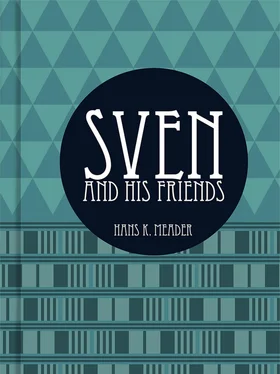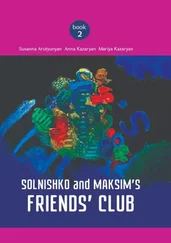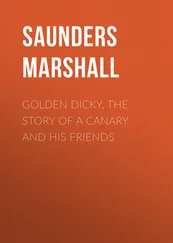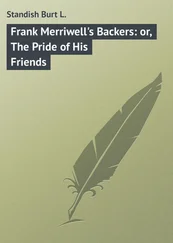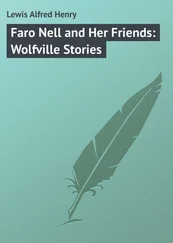Hans K. Maeder - Sven and his Friends
Здесь есть возможность читать онлайн «Hans K. Maeder - Sven and his Friends» — ознакомительный отрывок электронной книги совершенно бесплатно, а после прочтения отрывка купить полную версию. В некоторых случаях можно слушать аудио, скачать через торрент в формате fb2 и присутствует краткое содержание. Жанр: unrecognised, на английском языке. Описание произведения, (предисловие) а так же отзывы посетителей доступны на портале библиотеки ЛибКат.
- Название:Sven and his Friends
- Автор:
- Жанр:
- Год:неизвестен
- ISBN:нет данных
- Рейтинг книги:4 / 5. Голосов: 1
-
Избранное:Добавить в избранное
- Отзывы:
-
Ваша оценка:
- 80
- 1
- 2
- 3
- 4
- 5
Sven and his Friends: краткое содержание, описание и аннотация
Предлагаем к чтению аннотацию, описание, краткое содержание или предисловие (зависит от того, что написал сам автор книги «Sven and his Friends»). Если вы не нашли необходимую информацию о книге — напишите в комментариях, мы постараемся отыскать её.
Sven and his Friends — читать онлайн ознакомительный отрывок
Ниже представлен текст книги, разбитый по страницам. Система сохранения места последней прочитанной страницы, позволяет с удобством читать онлайн бесплатно книгу «Sven and his Friends», без необходимости каждый раз заново искать на чём Вы остановились. Поставьте закладку, и сможете в любой момент перейти на страницу, на которой закончили чтение.
Интервал:
Закладка:
"Come and have a swim Sven; I’m so hot."
Sven sat back on his heels. "You know Börge, I don’t think I will. I want to do some more building."
"All right. See you later." And Börge was off and into the sea.
Sven worked on. Presently two shadows fell across the castle and he looked up to see the English boys from his group. Sven smiled shyly, and said hello. This was the first time he had spoken to them.
"Hello" said the shorter boy. "I’m Fred Roberts. What’s your name?"
Sven told them, and after they had each practiced saying the foreign names Fred asked Sven what he was building.
Sven stood up and began to explain, very seriously, trying hard to get his English right. “This is the castle of Kronborg in Denmark. It was the castle of Hamlet. "
"Hamlet?" said George, the other English boy. ”I thought his castle was called Elsinore.”
"Oh no," replied Sven, "It is certainly Kronborg. I have been there with Börge and his father. I saw the tower where Hamlet poisoned his father."
"But I’m just doing Hamlet at school" George persisted. "Shakespeare, I mean" he added just a little condescendingly, in case Sven didn’t know. Sven shook his head. George began to get excited. "Dash it all Sven, I’m English. I should know what Shakespeare wrote."
This was too much for Sven’s patience. “And I’m Danish. I should know where Hamlet lived. He was a real Danish prince before your old Shakespeare ever heard of him." The words came tumbling out, and it didn’t make very good sense to George and Fred because it was half in English and half In Danish.
None of the boys noticed Jim Hutchinson join the group, till they heard a hearty laugh. "Can I help in this international dispute?" he inquired still laughing.
Suddenly the boys all felt very awkward. George spoke first. "Jim....of course it ‘really doesn’t matter, but Hamlet’s castle was called Elsinore, wasn’t it?"
"That’s what Shakespeare called it," replied Jim, "and the real historic Hamlet’s castle in Denmark is called Kronborg. Haven’t you ever heard of the same thing having two names, you young idiots?"
Everybody began to laugh and Jim grabbed Sven and George each by a tuft of hair and gave it a playful pull. "Let’s all go and have a swim," he suggested.
"Oh yes" said Sven, "and we’ll find Börge and he can explain all. He built most of the castle, you know," he explained to Fred as they ran down the beach.
* * *
By noon the following day all the castles were finished. The boys were sitting in a large semi-circle on the beach waiting for the judges to announce the prize-winner. Three of the counselors had formed the committee of judges, and they had spent most of the morning walking round the beach looking at the castles with a swarm of excited boys on their heels. Now they were consulting their notes and adding up the points.
Sven wished they would hurry up. He was beginning to get hungry. George, who was lying beside him on the sand, pulled at his shirt sleeve. "Look Sven, Pierre Dernier’s just going to speak — he’s going to say you and Börge have won first prize!"
"Sh-sh George, you know we haven’t a chance. Listen!"
Monsieur Dernier, the chief judge, was beginning to talk: "Well, boys, first I want to congratulate you on the splendid buildings you have made in the sand. We cannot all visit each other’s country, but I feel that this morning on this beach here I have been to Rome and London, to Budapest, Vienna ..... “Sven looked across at Börge. He was sitting with his eyes shut and Sven couldn’t decide whether he was listening intently to Monsieur Dernier or taking a nap. Suddenly Börge opened his eyes, caught Sven’s glance, and gave him a sly wink. But Pierre Dernier’s voice was going on: "..... And so I am happy to tell you that we have decided first prize should go to" — a maddening pause —"Anton Hnatuk and his friends from Czechoslovakia, for their building of the Hradcin in Prague!"
Everyone clapped and cheered and the boys near Anton leaned across to pat his back and shake his hand. At last they were quiet again and Pierre Dernier went on:
"Second prize, Sven Hansen and Börge Lingstrom for their model of the Kronborg Castle."
George let out a cheer and gave Sven a thump that nearly knocked him flat on his face. Just what happened after that he hardly knew. He heard everyone clapping and laughing but somehow all the noises and color around him melted into a haze through which he suddenly saw Börge’s face grinning at him. He was too excited even to hear who had won third prize.
Now all the boys were scrambling to their feet and Herman was leading the way back to the camp for lunch.
There was always a lot of noise at mealtimes. The boys ate in a large building with a high thatched roof supported by rafters. It was originally built as a barn, and during this lovely summer weather the wide double doors always stood open. The sunshine streamed in on the boys as they sat on forms at long wooden tables. Some martins had built a nest under the eaves and sometimes they flew into the barn and circled swiftly round, high up in the shadows. Then they would fly twittering out into the sun again.
Somehow everyone seemed to talk very loudly at mealtimes, perhaps in an effort to be heard above the clatter of mugs and plates on the bare tables, perhaps because they were all talking different languages, and when people don’t quite understand you, it’s always a temptation to shout.
George was shouting now, across the table; "I say Sven, Herman told me some of the fellows are going haying this afternoon.”
"What is "haying”?" inquired Sven.
"You know, gathering up hay."
"I don’t know what is ‘hay’." That was a new English word for Sven.
George explained and also told him the other things he had heard about the haying. Hay was almost the only crop on the little island of Suederoog, as it was on all the Frisian Islands. But it was a very important crop, because the islanders needed it to feed their cattle during the winter. The island houses, like the one house on Suederoog where the boys had their camp, were built with high roomy attics and these were used to store the hay. In a good summer the islanders cut the hay as often as three times. "Do you want to go haying, George?" inquired Sven. He was so fond of the beach that he wasn’t sure he liked the idea.
"Oh yes, Sven," replied George, "It’s really good. You’ll see. They have quite a special way of doing it here. I was watching them this morning."
The boys took it in turns to help with the haymaking, and it was several days before Sven and the rest of his group had their first taste of it.
Hans Koenig, who lived on the island, was in charge, and he led the boys off to a meadow where the hay had been cut several days before and had been spread out to dry. First he chose six boys, gave them large wooden rakes, and showed them how to rake the hay into long heaps running the whole length of the meadow, like walls of hay. Then he led the other boys over to a corner where the horses were standing. The horses were harnessed together in pairs, and attached to their harness were two long stout ropes. The ropes were fastened to each end of a heavy pole which lay on the ground behind them. It was long and thick, almost as big as a telegraph pole.
Hans explained to the boys what they were all going to do. He himself would drive the horses forward, making them walk one on each side of the wall of hay.’ They would drag the pole along behind them, and so all the hay would collect in front of it into a huge pile.
"Now this is where you boys come in," went on Hans in his slow German, "I want you to ride on the pole and keep it down on the ground. Will you do that?"
Sure they would!
Читать дальшеИнтервал:
Закладка:
Похожие книги на «Sven and his Friends»
Представляем Вашему вниманию похожие книги на «Sven and his Friends» списком для выбора. Мы отобрали схожую по названию и смыслу литературу в надежде предоставить читателям больше вариантов отыскать новые, интересные, ещё непрочитанные произведения.
Обсуждение, отзывы о книге «Sven and his Friends» и просто собственные мнения читателей. Оставьте ваши комментарии, напишите, что Вы думаете о произведении, его смысле или главных героях. Укажите что конкретно понравилось, а что нет, и почему Вы так считаете.
